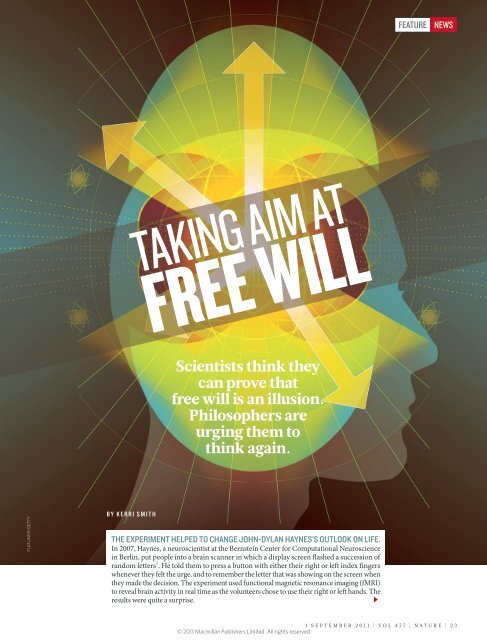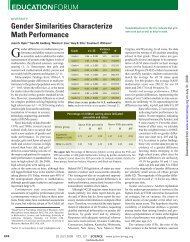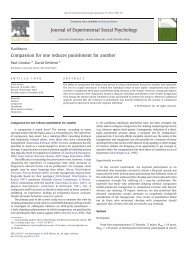Taking Aim at Free Will - Kreiman Lab
Taking Aim at Free Will - Kreiman Lab
Taking Aim at Free Will - Kreiman Lab
Create successful ePaper yourself
Turn your PDF publications into a flip-book with our unique Google optimized e-Paper software.
FEATURENEWSTAKING AIM ATFREE WILLScientists think theycan prove th<strong>at</strong>free will is an illusion.Philosophers areurging them tothink again.FLATLINER/GETTYBY KERRI SMITHTHE EXPERIMENT HELPED TO CHANGE JOHN-DYLAN HAYNES’S OUTLOOK ON LIFE.In 2007, Haynes, a neuroscientist <strong>at</strong> the Bernstein Center for Comput<strong>at</strong>ional Neurosciencein Berlin, put people into a brain scanner in which a display screen flashed a succession ofrandom letters 1 . He told them to press a button with either their right or left index fingerswhenever they felt the urge, and to remember the letter th<strong>at</strong> was showing on the screen whenthey made the decision. The experiment used functional magnetic resonance imaging (fMRI)to reveal brain activity in real time as the volunteers chose to use their right or left hands. Theresults were quite a surprise.1 SEPTEMBER 2011 | VOL 477 | NATURE | 23© 2011 Macmillan Publishers Limited. All rights reserved
FEATURENEWSwill like th<strong>at</strong>, says Mele. Many are m<strong>at</strong>erialists— believing th<strong>at</strong> everything has a physicalbasis, and decisions and actions come frombrain activity. So scientists are weighing in ona notion th<strong>at</strong> philo sophers consider irrelevant.Nowadays, says Mele, the majority ofphilosophers are comfortable with the ide<strong>at</strong>h<strong>at</strong> people can make r<strong>at</strong>ional decisions in adeterministic universe. They deb<strong>at</strong>e the interplaybetween freedom and determinism — thetheory th<strong>at</strong> everything is predestined, either byf<strong>at</strong>e or by physical laws — but Roskies says th<strong>at</strong>results from neuroscience can’t yet settle th<strong>at</strong>deb<strong>at</strong>e. They may speak to the predictabilityof actions, but not to the issue of determinism.Neuroscientists also sometimes have misconceptionsabout their own field, says MichaelGazzaniga, a neuroscientist <strong>at</strong> the University ofCalifornia, Santa Barbara. In particular, scientiststend to see prepar<strong>at</strong>ory brain activity asproceeding stepwise, one bit <strong>at</strong> a time, to a finaldecision. He suggests th<strong>at</strong> researchers shouldinstead think of processes working in parallel,in a complex network with inter actions happeningcontinually. The time <strong>at</strong> which onebecomes aware of a decision is thus not asimportant as some have thought.BATTLE OF WILLSThere are conceptual issues — and then thereis semantics. “Wh<strong>at</strong> would really help is ifscientists and philosophers could come to anagreement on wh<strong>at</strong> free will means,” says Glannon.Even within philosophy, definitions offree will don’t always m<strong>at</strong>ch up. Some philosophersdefine it as the ability to make r<strong>at</strong>ionaldecisions in the absence of coercion. Somedefinitions place it in cosmic context: <strong>at</strong> themoment of decision, given everything th<strong>at</strong>’shappened in the past, it is possible to reach adifferent decision. Others stick to the idea th<strong>at</strong>a non-physical ‘soul’ is directing decisions.Neuroscience could contribute directly totidying up definitions, or adding an empiricaldimension to them. It might lead to a deeper,better understanding of wh<strong>at</strong> freely willingsomething involves, or refine views of wh<strong>at</strong>conscious intention is, says Roskies.Mele is directing the Templeton Found<strong>at</strong>ionproject th<strong>at</strong> is beginning to bring philosophersand neuroscientists together. “I think if we doa new gener<strong>at</strong>ion of studies with better design,we’ll get better evidence about wh<strong>at</strong> goes onin the brain when people make decisions,” hesays. Some informal meetings have alreadybegun. Roskies, who is funded through theprogramme, plans to spend time this year inthe lab of Michael Shadlen, a neuro physiologist<strong>at</strong> the University of Washington in Se<strong>at</strong>tle whoworks on decision-making in the prim<strong>at</strong>ebrain. “We’re going to hammer on each otheruntil we really understand the other person’spoint of view, and convince one or other of usth<strong>at</strong> we’re wrong,” she says.THAT THERE ARE SOME PHYSICALFACTORS THAT INFLUENCE DECISION-MAKING SHOULDN’T BE A SURPRISE.Haggard has Templeton funding for aproject in which he aims to provide a way toobjectively determine the timing of consciousdecisions and actions, r<strong>at</strong>her than rely onsubjective reports. His team plans to devisean experimental set-up in which people playa competitive game against a computer whiletheir brain activity is decoded.Another project, run by Christof Koch,a bioengineer <strong>at</strong> the California Institute ofTechnology in Pasadena, will use techniquessimilar to Fried’s to examine the responses ofindividual neurons when people use reason tomake decisions. His team hopes to measurehow much weight people give to different bitsof inform<strong>at</strong>ion when they decide.Philosophers are willing to admit th<strong>at</strong>neuro science could one day trouble the conceptof free will. Imagine a situ<strong>at</strong>ion (philosopherslike to do this) in which researcherscould always predict wh<strong>at</strong> someone woulddecide from their brain activity, before thesubject became aware of their decision. “If th<strong>at</strong>turned out to be true, th<strong>at</strong> would be a thre<strong>at</strong> tofree will,” says Mele. Still, even those who haveperhaps prem<strong>at</strong>urely proclaimed the de<strong>at</strong>h offree will agree th<strong>at</strong> such results would have tobe replic<strong>at</strong>ed on many different levels of decision-making.Pressing a button or playing agame is far removed from making a cup of tea,running for president or committing a crime.The practical effects of demolishing freewill are hard to predict. Biological determinismdoesn’t hold up as a defence in law. Legalscholars aren’t ready to ditch the principle ofpersonal responsibility. “The law has to bebased on the idea th<strong>at</strong> people are responsiblefor their actions, except in exceptional circumstances,”says Nicholas Mackintosh, director ofa project on neuroscience and the law run bythe Royal Society in London.Owen Jones, a law professor <strong>at</strong> VanderbiltUniversity in Nashville, Tennessee, who directsa similar project funded by the Mac ArthurFound<strong>at</strong>ion in Chicago, Illinois, suggests th<strong>at</strong>the research could help to identify an individual’slevel of responsibility. “Wh<strong>at</strong> we are interestedin is how neuroscience can give us a moregranul<strong>at</strong>ed view of how people vary in theirability to control their behaviour,” says Jones.Th<strong>at</strong> could affect the severity of a sentence, forexample.The answers could also end up influencingpeople’s behaviour. In 2008, K<strong>at</strong>hleen Vohs, asocial psychologist <strong>at</strong> the University of Minnesotain Minneapolis, and her colleagueJon<strong>at</strong>han Schooler, a psychologist now <strong>at</strong> theUniversity of California, Santa Barbara, publisheda study 5 on how people behave whenthey are prompted to think th<strong>at</strong> determinismis true. They asked their subjects to read oneof two passages: one suggesting th<strong>at</strong> behaviourboils down to environmental or genetic factorsnot under personal control; the other neutralabout wh<strong>at</strong> influences behaviour. The participantsthen did a few m<strong>at</strong>hs problems on acomputer. But just before the test started, theywere informed th<strong>at</strong> because of a glitch in thecomputer it occasionally displayed the answerby accident; if this happened, they were to clickit away without looking. Those who had readthe deterministic message were more likely toche<strong>at</strong> on the test. “Perhaps, denying free willsimply provides the ultim<strong>at</strong>e excuse to behaveas one likes,” Vohs and Schooler suggested.Haynes’s research and its possible implic<strong>at</strong>ionshave certainly had an effect on how hethinks. He remembers being on a plane on hisway to a conference and having an epiphany.“Suddenly I had this big vision about the wholedeterministic universe, myself, my place in itand all these different points where we believewe’re making decisions just reflecting somecausal flow.” But he couldn’t maintain thisimage of a world without free will for long.“As soon as you start interpreting people’sbehaviours in your day-to-day life, it’s virtuallyimpossible to keep hold of,” he says.Fried, too, finds it impossible to keep determinism<strong>at</strong> the top of his mind. “I don’t thinkabout it every day. I certainly don’t think aboutit when I oper<strong>at</strong>e on the human brain.”Mele is hopeful th<strong>at</strong> other philosophers willbecome better acquainted with the science ofconscious intention. And where philosophy isconcerned, he says, scientists would do well tosoften their stance. “It’s not as though the taskof neuro scientists who work on free will has tobe to show there isn’t any.” ■Kerri Smith is editor of the N<strong>at</strong>ure Podcast,and is based in London.1. Soon, C. S., Brass, M., Heinze, H.-J. & Haynes, J.-D.N<strong>at</strong>ure Neurosci. 11, 543–545 (2008).2. Libet, B., Gleason, C. A., Wright, E. W. & Pearl, D. K.Brain 106, 623–642 (1983).3. Bode, S. et al. PLoS ONE 6, e21612 (2011).4. Fried, I., Mukamel, R. & <strong>Kreiman</strong>, G. Neuron 69,548–562 (2011).5. Vohs, K. D. & Schooler, J. W. Psychol. Sci. 19, 49–54(2008).1 SEPTEMBER 2011 | VOL 477 | NATURE | 25© 2011 Macmillan Publishers Limited. All rights reserved




